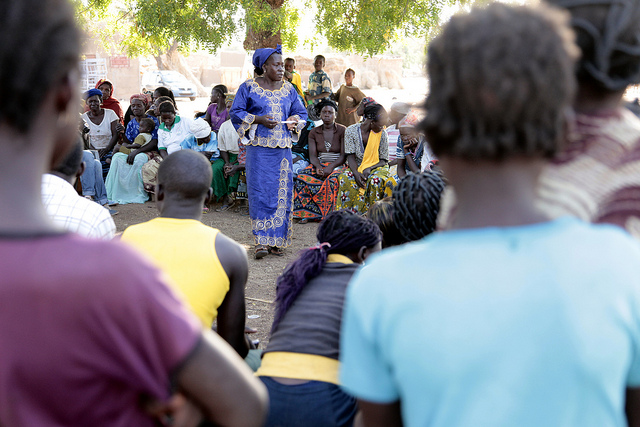
Burkina Faso | Ensure full implementation of important new law on human rights defenders
In a welcome development, Burkina Faso has adopted a national law for the protection of defenders. The adoption follows a civil society campaign across West Africa encouraging States to do more to protect defenders through national laws and policies. It is imperative that the law is now fully and effectively implemented in line with the UN Declaration on Human Rights Defenders.
The Burkina Faso Coalition of Human Rights Defenders (CBDDH), the International Service for Human Rights (ISHR) and the West African Human Rights Defenders Network (WAHRDN) welcome the adoption by the National Assembly of Burkina Faso of a national law protecting and promoting the rights of human rights defenders. The law was passed on 27 June and has now entered into force following its signature and publication by the head of State.
In addition to Burkina Faso, the West African states of Côte d’Ivoire and Mali have also recently developed national laws protecting human rights defenders.
‘We are pleased that, as a result of civil society’s advocacy, more and more countries in West Africa are developing and adopting laws to recognise and protect human rights defenders. We strongly encourage other countries in the region to work with civil society to develop and effectively implement national laws to ensure a safe and enabling environment within which defenders can undertake their vital work,’ said Mélanie Sonhaye Kombate, Program and Advocacy Director to the Secretariat of the West African Human Rights Defenders Network.
ISHR, CBDDH and WAHRDN noted the guidance provided by a Model Law for the recognition and protection of human rights defenders, which is reflected in some provisions of the Burkinabe law. For example, there is a broad definition of the term ‘human rights defenders’, which recognises that any person or group of individuals may be described as a defender without the need for prior registration that may restrict their activity (article 4). The law also takes into account the protection of defenders against reprisals, arbitrary detention or execution in relation to their activities (article 12).
While this is a significant step toward the protection of defenders in Burkina Faso, CBDDH, ISHR and the WAHRDN remain concerned by the absence of some protections in the law, such as provisions providing specific protections for women human rights defenders.
‘Women human rights defenders face particular challenges that require specific legal protection to ensure they are safe from violence and discrimination and can operate in safe and enabling environment,’ said Florence Ouattara, National Coordinator of the Burkinabe Coalition of Human Rights Defenders.
It is also concerning that the law does not contain specific provisions establishing a protection mechanism for defenders. Disappointingly the decree which organises the functioning of National Human Rights Commissions simply states that this institution is in charge of defender protection (article 14).
‘It is impotant that any law for the protection of human rights defenders complies with the UN Declaration on Human Rights Defenders and establishes an effective protection mechanism. In the absence of such provisions – as is the case with this law – it is essential that any protection mechanism established by the National Human Rights Commission has political support of the authorities and access to all the resources necessary for its functioning,’ said Clément Voule, Africa Advocacy Director with the International Service for Human Rights. ‘Such a mechanism is important to prevent, protect against, investigate and pursue accountability for attacks and other violations against human rights defenders,’ added Voule.
CBDDH, ISHR and WAHRDN will continue to work together to monitor the development and implementation of this law. They call on Government to provide adequate human and financial resources to the National Human Rights Commission to ensure the establishment and functioning of effective national protection mechanism.
CBDDH, ISHR and WAHRDN also reiterate their readiness to continue to support the Burkinabe authorities for the effective implementation of the law. The development of the law is just one step; it is integral that the authorities now work to ensure this law is implemented efficiently and effectively.
Contact: Clement Voule at [email protected]
Photo: Flickr Jessica Lea/DFID.
